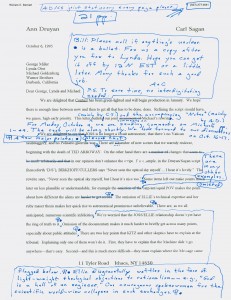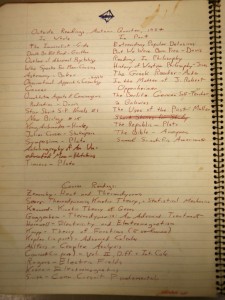The Library of Congress’s acquisition of Carl Sagan’s papers in late June presents researchers with new opportunities to learn about the noted astronomer and scientific communicator’s life and work. While the majority of research will presumably focus on his scientific activities, the Library’s initial release of several digitized items from the collection demonstrates that many treasures await anyone interested in his literary influences and productions.
One such gem is a list of “outside readings” that Sagan planned to tackle in the fall of 1954 while attending the University of Chicago. Among the literary works on the list are André Gide’s The Immoralist, Aldous Huxley’s short story “Young Archimedes,” Shakespeare’s Julius Caesar, and what appears to be the first volume of Star Science Fiction Stories (1953), which includes stories by Isaac Asimov, Ray Bradbury, and Arthur C. Clarke, among others.
Sagan wrote one novel, the best-selling Contact (1985), which in 1997 was turned into a movie starring Jodie Foster. Researchers studying the adaptation of the novel to film will want to review the following digitized letter from Carl Sagan and his wife Ann Druyan to Warner Brothers’ production team that discusses early plans and details for the science fiction drama.

Carl Sagan/Ann Druyan letter (page 1 of 2) to Warner Brothers’ production team, October 6, 1995. Manuscript Division, Library of Congress

Carl Sagan/Ann Druyan letter (page 2 of 2) to Warner Brothers’ production team, October 6, 1995. Manuscript Division, Library of Congress
Perhaps the item in the collection I’m most interested in reviewing is the poem “Buying War Stamps,” which Sagan wrote as a child and is the only poem in the collection of which I’m aware. Once the collection has been processed by the Library’s Manuscript Division (processing should be completed by November 2013), I hope to reproduce the poem–and any others found in the collection–on From the Catbird Seat. My guess is that it will compare favorably with the poetic efforts of the certain other famous Americans.
Although Sagan was not himself a poet, the rhythm and imagery on display in the best of his prose writing verges on the poetic, as demonstrated in his famous passage on pages 6-7 of Pale Blue Dot: A Vision of the Human Future in Space (1994), which you can listen to Sagan read (with minor adaptations) in this video from The Carl Sagan Portal.
Shortly before the Library acquired Sagan’s papers it recognized his importance to American society in another way: his book Cosmos, based on the award-winning PBS series, was named one of the “Books That Shaped America.”


August 24, 2012 at 12:27 pm
I hear that Mr. Sagan and Ms. Druyan wrote an early draft of Contact’s screenplay. Is there any way to see this?
August 30, 2012 at 10:47 am
Hi Mike,
Since Carl Sagan’s papers now form part of the Library’s Manuscript Division, you should contact the Manuscript Division directly to learn whether it’s possible to access an early draft of Contact‘s screenplay through them.
November 9, 2012 at 1:19 pm
I remember buying stamps in school and pasting them in a book. This was in the 1950′s. I remember my parents referring to them as war stamps. However, the war was over. I believe I redeemed book for a savings bond when it was full. I am interested in reading Carl Sagan’s poem.